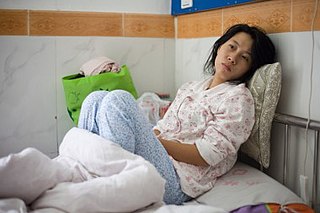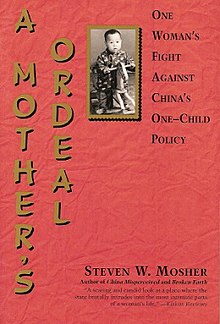
The term one-child policy refers to a population planning initiative in China implemented between 1980 and 2015 to curb the country's population growth by restricting many families to a single child. That initiative was part of a much broader effort to control population growth that began in 1970 and ended in 2021, a half century program that included minimum ages at marriage and childbearing, two child limits for many couples, minimum time intervals between births, heavy surveillance, and stiff fines for non-compliance. The program had wide-ranging social, cultural, economic, and demographic effects, although the contribution of one-child restrictions to the broader program has been the subject of controversy.

Sex-selective abortion is the practice of terminating a pregnancy based upon the predicted sex of the infant. The selective abortion of female fetuses is most common where male children are valued over female children, especially in parts of East Asia and South Asia, as well as in the Caucasus, Western Balkans, and to a lesser extent North America. Based on the third National Family and Health Survey, results showed that if both partners, mother and father, or just the father, preferred male children, sex-selective abortion was more common. In cases where only the mother prefers sons, this is likely to result in sex-selective neglect in which the child is not likely to survive past infancy.
"Anchor baby" is a term used to refer to a child born to a non-citizen mother in a country that has birthright citizenship which will therefore help the mother and other family members gain legal residency. In the U.S., the term is generally used as a derogatory reference to the supposed role of the child, who automatically qualifies as an American citizen under jus soli and the rights guaranteed in the Fourteenth Amendment to the U.S. Constitution. The term is also often used in the context of the debate over illegal immigration to the United States. A similar term, "passport baby", has been used in Canada for children born through so-called "maternity" or "birth tourism".
Steven Westley Mosher is an American social scientist, anti-abortion activist, neoconservative, anti-communist, and president of the Population Research Institute (PRI), which opposes population control and abortion. In the early 1990s, he was the director of the Claremont Institute's Asian Study Center, as well as a member of the US Commission on Broadcasting to China.
The Population Research Institute (PRI) is a 501(c)3 non-profit organization based in Front Royal, Virginia, US. The organization opposes abortion. They believe that overpopulation is a myth, and oppose hormonal birth control in females and vasectomies in males. In addition, the organization issues opinion pieces questioning the veracity of human driven climate change and the natural origin of COVID-19.

If These Walls Could Talk is a 1996 American television film, broadcast on HBO. It follows the plights of three different women and their experiences with abortion. Each of the three stories takes place in the same house, 22 years apart: 1952, 1974, and 1996. All three segments were co-written by Nancy Savoca. Savoca directed the first and second segment while Cher directed the third. The women's experiences in each vignette are designed to demonstrate the popular views of society on the issue in each of the given decades.
Mary Anne "Mamie" Cadden was an Irish midwife, backstreet abortionist, and convicted murderer. She was born 27 October 1891 in Scranton, Pennsylvania, US to the Irish parents of Patrick and Mary Cadden. In 1895, Cadden and her family returned to Ireland in County Mayo, where she completed years of schooling. Once she obtained her spot on the list of licensed midwives in Dublin, she opened a series of maternity nursing homes to aid women with health issues and to perform illegal abortions. After a series of criminal convictions, Cadden lost her status as a licensed midwife. In 1944, Cadden was charged and convicted for the murder of 33 year old Helen O'Reilly. She was sentenced to life in prison, and after a year at Mountjoy prison, she was declared insane and moved to the criminal lunatic asylum Dundrum, where she died of a heart attack on 20 April 1959. Although many people committed backstreet abortions during the period of Cadden's life, Cadden was the only person in Ireland to be sentenced to the death penalty for a maternal death occurring as a result of an abortion. As the most notorious Irish abortionist, the term 'Nurse Cadden' has become synonymous with evil.

Birth tourism is the practice of traveling to another country for the purpose of giving birth in that country. The main reason for birth tourism is to obtain citizenship for the child in a country with birthright citizenship. Such a child is sometimes called an "anchor baby" if their citizenship is intended to help their parents obtain permanent residency in the country. Other reasons for birth tourism include access to public schooling, healthcare, sponsorship for the parents in the future, or even circumvention of China's two-child policy. Popular destinations include the United States and Canada. Another target for birth tourism is Hong Kong, where some mainland Chinese citizens travel to give birth to gain right of abode for their children.
Pregnancy options counseling is a form of counseling that provides information and support regarding pregnancy. Women seeking pregnancy options counseling are typically doing so in the case of an unplanned or unintended pregnancy. Limited access to birth control and family planning resources, as well as misuse of birth control are some of the major contributing factors to unintended pregnancies around the world. In 2012, the global rate of unintended pregnancies was estimated to be 40 percent, or eighty-five million pregnancies.
Abortion in Romania is currently legal as an elective procedure during the first 14 weeks of pregnancy, and for medical reasons at later stages of pregnancy. In the year 2004, there were 216,261 live births and 191,000 reported abortions, meaning that 46% of the 407,261 reported pregnancies that year ended in abortion.
The legality of and public opinion toward abortion in Norway has changed dramatically in the last 100 years. Current Norwegian legislation and public health policy provides for abortion on request in the first 12 weeks of gestation, by application up to the 18th week, and thereafter only under special circumstances until the fetus is viable, which is usually presumed at 21 weeks and 6 days.

The lives of women in China have changed significantly due to the late Qing Dynasty reforms, the changes of the Republican period, the Chinese Civil War, and the rise of the People's Republic of China.
Abortion in China is legal and generally accessible. Regulations vary depending on the rules of the province or city, with some provinces prohibiting non-medical abortions after fourteen weeks of pregnancy during the second trimester. In 2021, China's State Council as well as the non-governmental organization responsible for family planning announced policy guidelines with the goal of reducing non-medically necessary abortions by increasing women's access to pre-pregnancy healthcare services. Sex-selective abortions are illegal nationwide as it leads to a imbalanced sex-ratio.
Lu Decheng was born in Liuyang, Hunan Province of China in 1963. He is best known for his role in the "Egg Washing" of Mao’s portrait in Tiananmen Square, along with two friends, Yu Dongyue and Yu Zhijian during the Tiananmen Square protests of 1989. The three men were caught by students and workers in the square, and turned over to the police. They were charged with counter revolutionary sabotage crimes against the Chinese Communist Party (CCP). Lu Decheng was sentenced to 16 years, Yu Dongyue received 20 years and Yu Zhijian was sentenced to life in prison. Lu Decheng was released after 9 years and left China for Canada in 2006.
A forced abortion may occur when the perpetrator causes abortion by force, threat or coercion, or by taking advantage of a situation where a pregnant individual is unable to give consent, or when valid consent is in question due to duress. This may also include the instances when the conduct was neither justified by medical or hospital treatment. Like forced sterilization, forced abortion may include a physical invasion of female reproductive organs.

On June 2, 2012, Feng Jianmei was forced to have an abortion in Zhenping County, Shaanxi, China, when she was seven months pregnant with her second child. Local officials had demanded that Feng and her husband pay a 40,000 yuan fine for violating the nation's one-child policy. When they were unable to do so, authorities arrested Feng, made her sign an agreement to have an abortion, and held her down while injecting her with an abortifacient. Feng was reportedly traumatized by the incident and in poor health afterwards.

Abortion-rights movements, also referred to as pro-choice movements, advocate for legal access to induced abortion services including elective abortion. It is the argument against the anti-abortion movement. The abortion rights movement seeks out to represent and support women who wish to terminate their pregnancy at any point. This movement attempts to establish a right for women to make the choice to have an abortion without fear of legal and/or social backlash. The issue of induced abortion remains divisive in public life, with recurring arguments to liberalize or to restrict access to legal abortion services. Abortion-rights supporters themselves are divided as to the types of abortion services that should be available and to the circumstances, for example different periods in the pregnancy such as late term abortions, in which access may be restricted.
Abortion in Kazakhstan is legal as an elective procedure up to 12 weeks, and special circumstances afterwards. The relevant legislation is based on the laws inherited from the country's Soviet past, when abortion was legally permitted as a contraceptive.

Abortion in South Korea was decriminalized, effective 2021, by a 2019 order of the Constitutional Court of Korea.
Abortion in Vermont is legal at all stages of pregnancy. 70% of adults said in a poll by the Pew Research Center that abortion should be legal in all cases.








